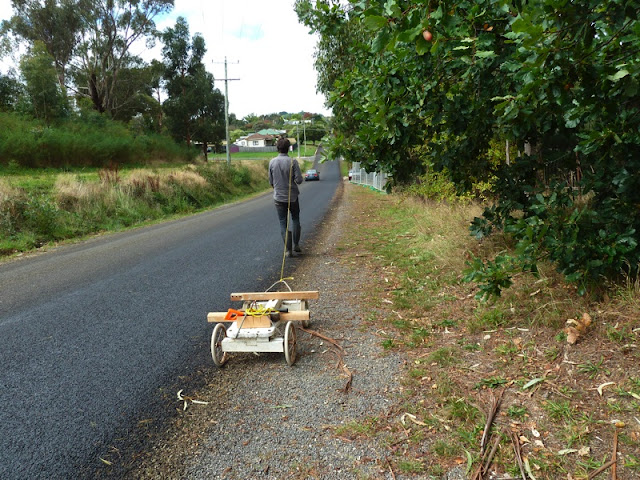We found some wood, you see. A whole stack of old hardwood batons that were holding up the tiles of a roof that was being retiled in time for the winter rains. The tiler was thrilled when we asked if we could take it, saving him a trip to the tip to dispose of it.
Off we went.
'But it's my billy cart, Dad. If you'd like to use it, you have to pull me up the hills.'
'Let's stack the longer bits first and then the small bits.'
Toot toot go the cars as we wobble down the footpath towards home.
A few days later we decided to take the billy cart on another adventure: to our newly opened local community op-shop. In no time at all we had completed our autumn clean-out and had filled five big bags of goodies to recycle.
The
Daylesford Community Op-Shop is based on a Swedish thrift store model: to provide local community members with what they need including electrical items, so they don't have to shop outside of town or buy new items, and all profits are then put back into the community.
Local not-for-profit organisations can apply to receive the profits for a month. The month of May for example is for
Hepburn Wildlife Shelter, which means that they promote that month as theirs. They can bring in their saved-up goods to be sold and their members volunteer at the op-shop.
Based on the size of our town the op-shop is forecast to inject $100,000 a year back into the community.
There's also a community space where mothers can nurse their babies, a book nook, a seed bank and a chai lounge. Pretty amazing, huh?
A brief stop at one of our
community food gardens to turn over the compost, and then on we go.
Back home and our day was not quite done. Inside our chicken coop, our birds have been flying over the low fence and have been digging up one of our vegie patches. We have been setting up more substantial fencing over the last few weeks. And after our recent score we finally had enough timber to make some gates.
We harvested the last of the potatoes and Jerusalem artichokes, dug the beds over, added compost and planted them out with heirloom vegies.
We planted broad beans, three varieties of carrots, kohlrabi, two varieties of beetroot, celeriac, leek and plenty of cabbage.
We are a bit obsessed with cabbage in our household. We love to eat it raw in salads but even more so, we love to lacto-ferment it into sauerkraut. Here is a jar of our latest batch.
And here is the final fruit of our labours: a stack of kindling wood ready for the winter.



























